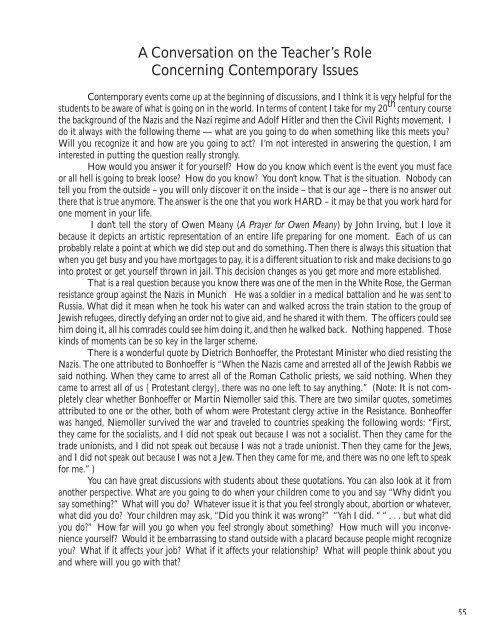Proceedings Colloquium on World History - Waldorf Research Institute
Proceedings Colloquium on World History - Waldorf Research Institute
Proceedings Colloquium on World History - Waldorf Research Institute
You also want an ePaper? Increase the reach of your titles
YUMPU automatically turns print PDFs into web optimized ePapers that Google loves.
A C<strong>on</strong>versati<strong>on</strong> <strong>on</strong> the Teacher’s Role<br />
C<strong>on</strong>cerning C<strong>on</strong>temporary Issues<br />
C<strong>on</strong>temporary events come up at the beginning of discussi<strong>on</strong>s, and I think it is very helpful for the<br />
students to be aware of what is going <strong>on</strong> in the world. In terms of c<strong>on</strong>tent I take for my 20 th century course<br />
the background of the Nazis and the Nazi regime and Adolf Hitler and then the Civil Rights movement. I<br />
do it always with the following theme — what are you going to do when something like this meets you?<br />
Will you recognize it and how are you going to act? I’m not interested in answering the questi<strong>on</strong>, I am<br />
interested in putting the questi<strong>on</strong> really str<strong>on</strong>gly.<br />
How would you answer it for yourself? How do you know which event is the event you must face<br />
or all hell is going to break loose? How do you know? You d<strong>on</strong>’t know. That is the situati<strong>on</strong>. Nobody can<br />
tell you from the outside – you will <strong>on</strong>ly discover it <strong>on</strong> the inside – that is our age – there is no answer out<br />
there that is true anymore. The answer is the <strong>on</strong>e that you work HARD – it may be that you work hard for<br />
<strong>on</strong>e moment in your life.<br />
I d<strong>on</strong>’t tell the story of Owen Meany (A Prayer for Owen Meany) by John Irving, but I love it<br />
because it depicts an artistic representati<strong>on</strong> of an entire life preparing for <strong>on</strong>e moment. Each of us can<br />
probably relate a point at which we did step out and do something. Then there is always this situati<strong>on</strong> that<br />
when you get busy and you have mortgages to pay, it is a different situati<strong>on</strong> to risk and make decisi<strong>on</strong>s to go<br />
into protest or get yourself thrown in jail. This decisi<strong>on</strong> changes as you get more and more established.<br />
That is a real questi<strong>on</strong> because you know there was <strong>on</strong>e of the men in the White Rose, the German<br />
resistance group against the Nazis in Munich He was a soldier in a medical battali<strong>on</strong> and he was sent to<br />
Russia. What did it mean when he took his water can and walked across the train stati<strong>on</strong> to the group of<br />
Jewish refugees, directly defying an order not to give aid, and he shared it with them. The officers could see<br />
him doing it, all his comrades could see him doing it, and then he walked back. Nothing happened. Those<br />
kinds of moments can be so key in the larger scheme.<br />
There is a w<strong>on</strong>derful quote by Dietrich B<strong>on</strong>hoeffer, the Protestant Minister who died resisting the<br />
Nazis. The <strong>on</strong>e attributed to B<strong>on</strong>hoeffer is “When the Nazis came and arrested all of the Jewish Rabbis we<br />
said nothing. When they came to arrest all of the Roman Catholic priests, we said nothing. When they<br />
came to arrest all of us { Protestant clergy}, there was no <strong>on</strong>e left to say anything.” (Note: It is not completely<br />
clear whether B<strong>on</strong>hoeffer or Martin Niemoller said this. There are two similar quotes, sometimes<br />
attributed to <strong>on</strong>e or the other, both of whom were Protestant clergy active in the Resistance. B<strong>on</strong>heoffer<br />
was hanged, Niemoller survived the war and traveled to countries speaking the following words: “First,<br />
they came for the socialists, and I did not speak out because I was not a socialist. Then they came for the<br />
trade uni<strong>on</strong>ists, and I did not speak out because I was not a trade uni<strong>on</strong>ist. Then they came for the Jews,<br />
and I did not speak out because I was not a Jew. Then they came for me, and there was no <strong>on</strong>e left to speak<br />
for me.” )<br />
You can have great discussi<strong>on</strong>s with students about these quotati<strong>on</strong>s. You can also look at it from<br />
another perspective. What are you going to do when your children come to you and say “Why didn’t you<br />
say something?” What will you do? Whatever issue it is that you feel str<strong>on</strong>gly about, aborti<strong>on</strong> or whatever,<br />
what did you do? Your children may ask, “Did you think it was wr<strong>on</strong>g?” “Yah I did. “ “ . . . but what did<br />
you do?” How far will you go when you feel str<strong>on</strong>gly about something? How much will you inc<strong>on</strong>venience<br />
yourself? Would it be embarrassing to stand outside with a placard because people might recognize<br />
you? What if it affects your job? What if it affects your relati<strong>on</strong>ship? What will people think about you<br />
and where will you go with that?<br />
55
















